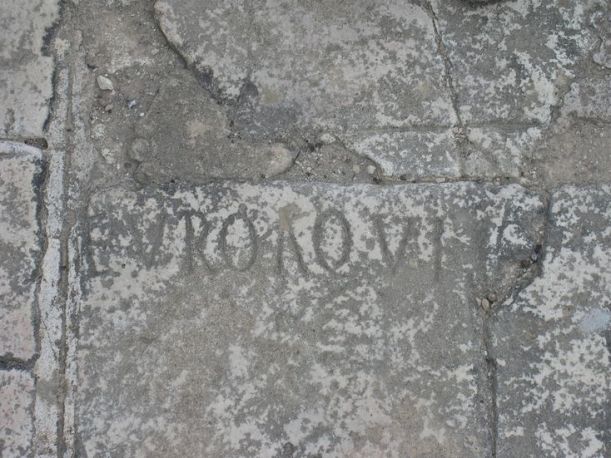… with apologies to fans of The Little Mermaid.
The adjective ὑπό-σαλος ‘under the sea’ is suspicious as a Greek word. It functions, so it seems, as an equivalent to a prepositional phrase such as ὑπὸ τοῦ ἁλός (‘under the sea’, but more likely to mean ‘because of the sea or salt’). The chief cause of suspicion is that Greek ἇλς ἁλός, ‘salt’, did not begin with a [s], at least not in historical Greek. We should find ὕφαλος (see also Buck-Petersen, p. 357 i), as, indeed, we do in Sophocles’ Antigone and subsequently. Indeed, the adjective occurs as a name in the context of ὑπόσάλος.
Before the Greek language was even written down, it lost the sound [s] at the beginning of words and between vowels. By contrast, Latin kept [s] at the beginning of words, so we get sets like ἇλς, Latin sal, and English ‘salt’, ἑπτά, septem, and seven, etc. ([s] between vowels in Latin is a story for another day…). The loss of [s] in both enviroments means that there was no Greek stem sal– on which to build our compound adjective and, if there had been such a stem at the time of that compound’s creation, the [s] between vowels would have been lost subsequently.
Where we find Greek words that begin with a sigma, that sigma cannot be original (one problem is that σῦς, ‘pig’, appears in Homer alongside the expected ὗς; cf. Latin sus, English swine). Explanations include the simplification of a cluster of consonants or that the word in question came into Greek after the loss of initial [s] had ceased to operate. As examples of the latter, consider σιμικίνθιον (semicinctium an apron), σουδάριον (sudarium a towel), and συμψέλια (subsellia seats of a certain kind), words that were borrowed from Latin by Greek speakers alongside what we may call the lexical residue of the Roman Imperial jackboot, or sandal: e.g., κεντυρίων (centurion), λεγιονάριος (legionarius), and πραιτώριον (praetorium).
Here’s the context for that sole instance of ὑπόσαλος as ‘under the sea’ in the Periplus Maris Magni or ‘Voyage around the Great Sea’ (aka Stadiasimos or ‘Measuring by Stades’), as quoted by one third-century Hippolytus in his Chronicle:
(72) Ἀπὸ τοῦ Εὐσχοίνου ἐπὶ τοὺς Ὑφάλους στάδιοι οʹ· νησίον ἐστὶν ὑπόσαλον· ἔχει δὲ καὶ αἰγιαλὸν βαθύν.
‘From Euschoinos to Hypaloi, seventy stades; the islet is under water; and it has a deep (or thick) beach.’
Before we try to explain how the sigma in ὑπόσαλος could be the [s] lost from the Greek equivalent of English ‘salt’ and Latin sal, let us consider whether salt or the sea needs to be involved in the word at all.
The sigma in ὑπόσαλος is so suspicious that the other analysis given in the same LSJ entry is worth considering:
‘II. shaken underneath, undermined, γῆ Plu.2.434c (ὑπὸ σάλου codd.); ὀδόντες ὑ. loose teeth, Dsc.1.105.5′ [also in Dsc.5.102.2, but that’s the lot] .
On that analysis, the sigma is unimpeachable: it was always there in σάλος, σαλεύω, etc., whatever the origin of the word (Beekes, true to character, classifies it as ‘Pre-Greek’), and, hence, could be justified in an adjective like ἐπίσαλος, which is also used by our Stadiasmos:
(55) Ἀπὸ Ναυσίδος εἰς Πτολεμαΐδα στάδιοι σνʹ· πόλις ἐστὶ μεγίστη· ἐπίσαλός ἐστιν ὁ τόπος, καὶ νῆσον ἔχει· Ἶλος καλεῖται· ἀσφαλίζου.
‘From Nausis to Ptolemais two-hundred and sixty stades: the city is very big; the place is rough (subject to storms), and has an island; it is called Ilos: go carefully!’
Could the islet in (72) — named Ὕφαλοι ! — simply mean ‘shaken underneath’ or ‘undermined’, or even ‘slightly shaken or storm-tossed’, since ὑπο- can add the notion ‘slightly, a bit, somewhat,…’ (trust me, I am/was a lexicographer)?
There are only a few other compound adjectives in -σαλος (ἀ-, εὔ-, and κονί-; very different are βήσαλον and φύσαλος: see Buck-Petersen, p. 359 ii) and none support the idea that the -σαλος part could be the salt sea rather than ‘shaken’.
So, it is likely that since ὑπό with χρῡσός means ‘with gold underneath’ (of the ground), ‘underneath/covered by gold, gilded’ (of an iron ring), or ‘containing a mixture or proportion of gold‘ (so LSJ, for some of the children in Plato’s Republic), ὑπό with σάλος could describe the islet as ‘with turbulence below’, ‘covered by rolling swells’, or ‘somewhat storm tossed’. There might be some sense in that in the Stadiasmos, a guidebook for sailors. If so, we can delete the first section of ὑπόσαλος from LSJ and make an improvement on its Supplement and Revised Supplement.
If not, can we explain why a salty word in Greek has a sigma? Does any help come from the long-term contact between speakers of Greek and speakers of Latin, especially in nautical contexts in texts from the time of the Roman Empire?
Could the sigma reflect a Latin (partial) origin for our ‘under the sea’ adjective? If so, how?
One possibility is that we have a ‘hybrid compound’: one part of the word is from one language, another from another. If that seems strange, it is no stranger than a tele-vision or an auto-mobile or a hetero-, homo-, or metro-sexual, all of which with a Greek start and a Latin finish. Perhaps, a seafarer who used Latin and Greek with some degree of mixture took Latin sal as the root of a new adjective and then qualified it with an element from his knowledge of Greek word-formation. Real ancient parallels would be ὑπο-καμίσ(ι)ον or ὑπο-καμάσιον ‘a shirt (Latin camisa) that is worn underneath (Greek), an undershirt’ and ὑπο-νοτάριος ‘a notary (Latin) who is underneath or subordinate (Greek), a deputy or sub-notary’.
Can we go a step further and see a ‘calque’ here? A ‘calque’ is an element-by-element translation of a term from one language into another. The Paradebeispiele or ‘Parade-Examples’ (or, in English, the ‘oft-cited examples’, if not ‘examples on parade’) are Modern Greek ουρανοξύστης, German Wolkenkratzer and French gratte-ciel, both based on English ‘skyscraper’, but not necessarily with the elements in the same order as in English.
In our case, the Latin term behind ὑπό-σαλος would be sub-salsus, ‘slightly salty’ (Oxford Latin Dictionary, p. 1848, s.v.), which is found in the medical writer Celsus and the encyclopaedist Pliny the Elder, respectively of water and of a plant. The calquer did not think to drop the [s] in his element-by-element translation: ὑπό- for sub-, Latinate σαλ(ο)-, not ἁλ- for sal, and then adjusting the formation to a Greek pattern (without sigma before the ending). It migth be a problem that σάλος is a noun, but salsus is an adjective. Should we expect ὑπ(ο-σ)άλιος as a calque of sub-salsus (cf. ἐνάλιος)? That said, a compound adjective ending in -αλ-ο-ς would be fine. Indeed, as we saw, ὕφ-αλος is attested — as is ἔναλος.
As a further complication, could the direction of calquing be the other way round: from Greek into Latin? Pliny the Elder is a major source of evidence for us of Latin borrowings of Greek words and of Greek words known only (or chiefly) from Latin authors and their texts. Celsus, as a medical writer, is exactly the kind of borrower and calquer of Greek words that we would expect to meet. (I know nothing about how much Greek influence Celsus actually shows…) An element-by-element translation of the Greek adjective would give a Latin adjective — something like sub-sal_sus. Besides, compounding is so restricted in Latin that Greek is normally involved at some level. I do not know how common it is for Latin sub- to add the notion of ‘slightly’, whereas for ὑπό- it is somewhat ubiquitous. The Oxford Latin Dictionary, p. 1835, s.v. sub- prefix., notes, ‘Before verbs and adjectives it indicates a reduced intensity in the action or quality…’. When and why sub- does so and in which authors are questions for another time. Even if the calquing happened into Latin from Greek, the sigma in ὑπόσαλος would remain unexplained.
Further, if, in ὑπόσαλος, we do have a calque from Latin and if ὑπόσαλος, ‘shaken underneath’, was already in use by the same speakers and/or in nautical registers (the writer of the Stadiasmos also used ἐπίσαλος…), we have a loan-shift or a semantic calque. That is, a Greek word gained a meaning through the use of a Latin counterpart or near-counterpart. For example, the Roman Republican historian Sallust used amare as ‘to be in the habit of’ (as well as ‘to love’), because Greek φιλεῖν could mean ‘to be in the habit of’ as well as ‘to love’. One of my suspicions about the entry in LSJ, second to the sigma between vowels in a salty word, was how the same word could have two meanings that were so different: ‘under the sea’ and ‘shaken underneath’. If one meaning is to do with salt and the other is to do with σαλός ‘shaking’, we have homonyms and should have two entries.
One final angle: with the meaning ‘under the sea’, ὑπόσαλος would be a ‘prepositional governing compound’, one, that is, that originated in a prepositional phrase. Let us suppose that a bilingual seafarer wanted to say ‘under the sea’ and began in Greek (ὑπό), then started to continue in Latin, either with sale (ablative of sal) or with the dative sali with the genitive salis (because Greek did not have an ablative for him to use), but finished with a Greek ending. Such a hypothetical prepositional phrase would be a peculiar kind of code-switch: a speaker’s (or writer’s) switch from one language to another mid-sentence, mid-phrase, or even mid-word. My favourite code-switch is still that in the title of a paper by Poplack: ‘Sometimes I’ll start a sentence in Spanish Y TERMINO EN ESPAÑOL’.
The last word: as St Paul was on his way to Italy by sea, the Acts of the Aposles 27:14 (a turbulent text) names a wind as εὐρ-ακύλων, which has a counterpart in Latin script in euro-aquilo (CIL VIII 26652: see below) a east-north wind. The first part is Greek, the second Latin (whatever the script). The Bauer-Danker Lexicon quaintly calls it ‘a hybrid formation of Lat.-Gk. sailor’s language’. Was the Greek element ‘borrowed’ into Latin and then the whole borrowed into Greek or was the Latin element borrowed into Greek and then the whole borrowed back into Latin?









